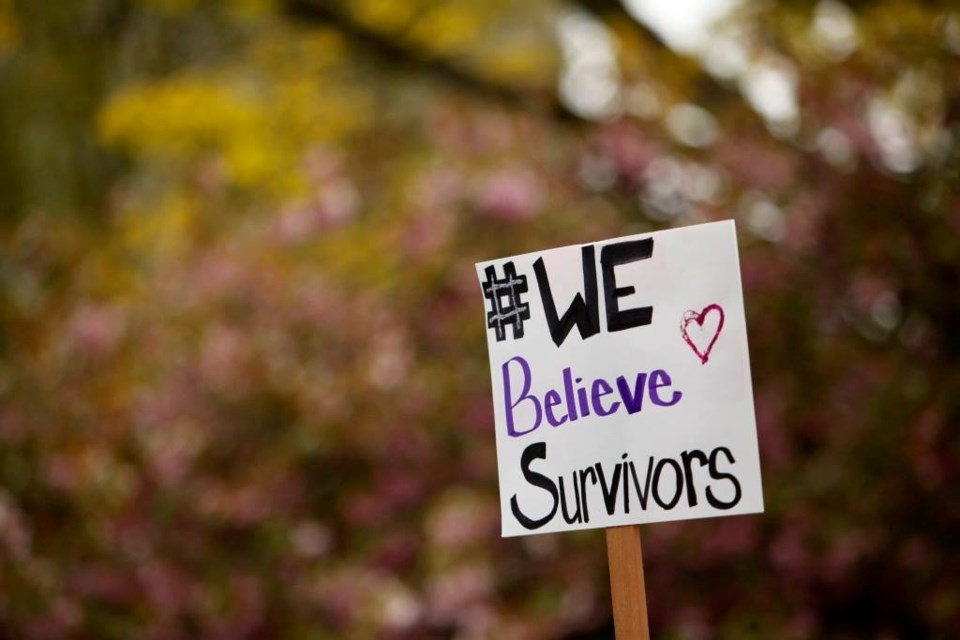This year the Victoria Sexual Assault Centre celebrates 40 years supporting survivors in the capital region, at a time when requests for our services are only accelerating.
Since 2015, we have seen a dramatic 54 per cent increase in the demand for our counselling and support services, and growing interest in our preventative education programming. Sexual assault is an urgent and ongoing public health emergency facing Canadian society. It is time that we start addressing it as such.
Sexual assault is often thought of as a criminal matter. But instead of relying on the fear of punishment to deter sexual assault, a better approach is to stop it in its tracks. Providing public health funding for survivors and for prevention education can help to do just that.
Sexual assault is pervasive in Canadian society, although it affects some populations more than others. Data from Statistics Canada shows that young females and children are at a high risk of being sexually assaulted, with 30 per cent of women experiencing it at least once in their lives.
These rates are even higher for trans folks in Canada, at 50 per cent. Finally, as many as 60 per cent of disabled folks, Indigenous women and girls, and Two-Spirit individuals are sexual assault survivors.
Nearly one in four men experience unwanted sexual activity involving physical violence. This means you, your sibling, your best friend, your colleague, or your neighbour. Everyone knows someone who has been sexually assaulted. You just might not be aware of their experience.
Stigma surrounding sexual assault means often survivors hide their trauma and suffer alone. But its impact on their physical and mental health can be seen – and is measurable. The Government of Canada places the overall cost (personal, employment, and justice system) of sexual assault and other sexual offences at $4.8 billion in 2009 alone.
These costs are not going down. Statistics Canada reports that since 2014, sexual assault is the only violent crime for which rates are rising. Finding a solution involves treating sexual assault as a public health concern and investing in proven alternatives: Healing and prevention.
The public needs to have an unflinching conversation about the enduring harms of sexual assault. Its effects on survivors are complex.
There may be injuries to the body that have long-term repercussions. Unwanted pregnancies can be difficult for survivors for many emotional, physical, and economic reasons. Mental health concerns such as depression, PTSD, and substance use may result.
Because of stigma, survivors may not access physical and mental health care until symptoms are acute, painful, and unrelenting. This is often the point where we at the Victoria Sexual Assault Centre meet survivors. We know that quick access to health services and targeted counselling can mitigate these destructive impacts. It is crucial that these services exist and that survivors can access them promptly.
Prevention also plays a key role. Expanded public health funding is needed for student-led consent workshops in our high schools and universities so that youth have an opportunity to learn about the importance of consent.
Workplaces in British Columbia need to be supported to develop robust internal disclosure procedures so that harm can be identified before it escalates.
Approaching these avenues of prevention with a commitment to equity and culturally informed and led programming will mean that the most vulnerable can be better protected.
The recent British Columbia government’s commitment of $22 million in core funding to sexual assault support programs over the next three years is a good place to start. This means that VSAC will be able to continue its work to support survivors.
However, much more is needed to move us all to a better – and safer – future. Sexual assault is preventable: we know that ending stigma, public health interventions, and community commitment can make a world of difference.
Anna Bruce is a junior gender equity policy analyst at the Organization for Economic Co-operation and Development as well as a front-line volunteer and board member at the Victoria Sexual Assault Centre. Sara Beam is a professor of history at the University of Victoria and also a board member at VSAC.



